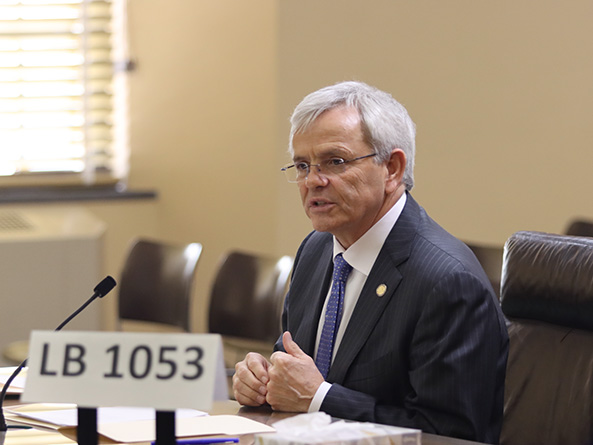Bill would allow judges to authorize virtual conferencing
A Nebraska judge could authorize the use of video, electronic or telephonic technology for certain hearings under a proposal heard by the Judiciary Committee Feb. 17.

Current state law allows for use of virtual conferencing when all parties give consent. Under LB1053, introduced by Omaha Sen. Steve Lathrop, a judge who finds good reason could use their discretion to authorize the use of virtual conferencing for civil, juvenile and some pre-trial motion hearings, as long as the hearing allows for public access and for an accurate record to be preserved.
In addition, a virtual hearing would require that a party could communicate confidentiality with counsel. A judge could require the parties to pay for costs incurred for the virtual conferencing. For a criminal case that involves live testimony, a court would require consent from all parties for the use of virtual conferencing.
Lathrop said virtual court proceedings would provide courts and lawyers an opportunity to increase efficiency.
“COVID has brought our judicial system to the realization that sometimes there are other ways to discharge the function of having hearings and having trials other than in person,” Lathrop said.
State court administrator Corey Steel testified in support of LB1053. Judges are trusted every day to make decisions, Steel said, and they also should be authorized to decide how a court proceeding is held. Additionally, he said, research shows there was a dramatic increase in divorce and child custody proceedings when many courts across the country went virtual during the pandemic.
“This is another mechanism in order for the judicial branch to continue to move cases through our dockets so that we do not continue to see a backlog,” Steel said. “Justice delayed is justice denied.”
Spike Eickholt, testifying on behalf of the Nebraska Criminal Defense Attorneys Association, spoke in opposition to the bill. It’s “disingenuous” to say that a Zoom hearing is the same as an in-person proceeding, he said, even if it is convenient.
“Courts are for litigants. Courts are for the people to use as a branch of government,” Eickholt said. “It’s not for the convenience of judges. If somebody wants to have a live hearing to try to convince a judge of something … even on a procedural matter, that is their prerogative.”
Jason Grams, president-elect of the Nebraska State Bar Association, also spoke in opposition. Currently, courts are allowed to determine how a non-evidentiary hearing is held — virtually, by telephone or live — however, evidentiary hearings require the consent of all parties, he said.
Grams said the NSBA opposes the bill because it would expand the court’s discretion to order all hearings over the objection of one of the parties, adding that not even all judges among the organization’s membership agree with the proposal.
The committee took no immediate action on LB1053.


